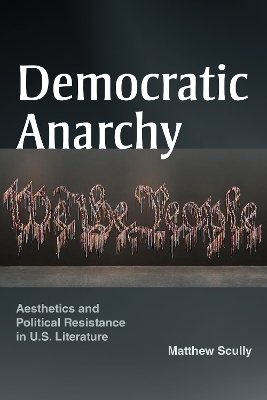
Democratic Anarchy
Fordham University Press (Verlag)
978-1-5315-0706-0 (ISBN)
Democratic Anarchy grapples with an uncomfortable but obvious truth inimical to democracy: both aesthetics and politics depend on the structuring antagonism of inclusion and exclusion. Yet in Democratic Anarchy, Matthew Scully asks, how can “the people” be represented in a way that acknowledges what remains unrepresentable? What would it mean to face up to the constitutive exclusions that haunt U.S. democracy and its anxious fantasies of equality?
Synthesizing a broad range of theoretical traditions and interlocutors—including Lacan, Rancière, Edelman, and Hartman—Democratic Anarchy polemically declares that there has never been, nor can there ever be, a realized democracy in the U.S. because democracy always depends on the hierarchical institution of a formal order by one part of the population over another. Engaging with an expansive corpus of American literature and art (Harriet Jacobs, Nathaniel Hawthorne, Louis Zukofsky, Thomas Pynchon, Toni Morrison, Theresa Hak Kyung Cha, Nari Ward, Ocean Vuong, and Safiya Sinclair), Democratic Anarchy argues that many liberal concepts and institutions are in fact structurally opposed to democratic equality because they depend on regulating what can appear and in what form.
By focusing on works that disrupt this regulatory impulse, Scully shows how rhetorical strategies of interruption, excess, and disorder figure the anarchic equality that inegalitarian fantasies of democracy disavow. Democratic Anarchy develops a rigorous theory of equality that refuses to repeat the inequalities against which it positions itself, and it does so by turning to moments of resistance—both aesthetic and political—inaugurated by the equality that inheres in and antagonizes the order of things.
Matthew Scully is Lecturer in American Literature and Culture at the University of Lausanne. His work has appeared in numerous journals, including the Journal of Modern Literature, Diacritics, African American Review, American Literature, Critical Inquiry, and Postmodern Culture.
Introduction: Democracy’s Death Drive | 1
Part I: Democratic Aesthetics
1 The Genres of Democracy: Romance, Sentiment, and the Slave Narrative | 39
2 Parataxis and Metalepsis, or Figures of Democratic Equality | 71
Part II: Aestheticidal Resistance
3 A Poetics of Dissensus: Migrant, Citizen, and the Catachresis of Identity | 113
4 Against Representation, or Utopia After All | 147
Coda: Disavowal and Figural Annihilation | 179
Acknowledgments | 183
Notes | 187
Bibliography | 239
Index | 261
| Erscheinungsdatum | 04.06.2024 |
|---|---|
| Zusatzinfo | 5 b/w illustrations |
| Verlagsort | New York |
| Sprache | englisch |
| Maße | 152 x 229 mm |
| Themenwelt | Geisteswissenschaften ► Sprach- / Literaturwissenschaft ► Anglistik / Amerikanistik |
| Geisteswissenschaften ► Sprach- / Literaturwissenschaft ► Literaturwissenschaft | |
| Sozialwissenschaften ► Politik / Verwaltung ► Politische Theorie | |
| ISBN-10 | 1-5315-0706-9 / 1531507069 |
| ISBN-13 | 978-1-5315-0706-0 / 9781531507060 |
| Zustand | Neuware |
| Haben Sie eine Frage zum Produkt? |
aus dem Bereich


